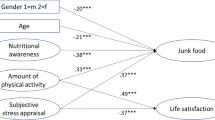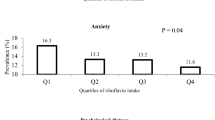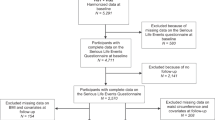Abstract
Background/Objective:
Psychological resilience is a measure of stress coping ability and has been associated with favourable health outcomes. While evidence on the relationship of dietary habits with a number of psychosocial conditions is available, there is lack of studies on their association with psychological resilience in a general adult population.
Subjects/Methods:
Cross-sectional analysis on 10 812 subjects recruited within the cohort of the Moli-sani study (2005–2010). Psychological resilience was measured by the 25-item Connor-Davidson Psychological Resilience Scale. Food intake was recorded by the EPIC food frequency questionnaire and adherence to Mediterranean diet was appraised by both a Greek Mediterranean diet score and an Italian Mediterranean Index. Empirically derived dietary patterns were obtained by principal factor analysis. Multivariable linear regression analysis (95%CI) was used to test the association between dietary scores and psychological resilience.
Results:
Higher adherence to Mediterranean-type diets or consumption of a vegetable-based dietary pattern (obtained from principal factor analysis) were positively associated with psychological resilience (β=0.43; 95%CI: 0.19–0.66, β=0.92; 0.69–1.16, and β=1.18; 0.93–1.44, for Greek Mediterranean diet score, Italian Mediterranean Index and the ‘Olive oil and vegetables pattern’, respectively). Dietary polyphenol or antioxidant intakes and greater variety in fruit and vegetable consumption were also positively associated with psychological resilience, while the associations with Western-like diets were weak.
Conclusions:
In conclusion, Mediterranean diet, vegetable-based dietary patterns and better diet quality were all positively associated with higher psychological resilience, whereas Western-type diets were not.
This is a preview of subscription content, access via your institution
Access options
Subscribe to this journal
Receive 12 print issues and online access
$259.00 per year
only $21.58 per issue
Buy this article
- Purchase on Springer Link
- Instant access to full article PDF
Prices may be subject to local taxes which are calculated during checkout

Similar content being viewed by others
References
Connor KM, Davidson JR . Development of a new resilience scale: the Connor-Davidson Resilience Scale (CD-RISC). Depress Anxiety 2003; 18: 76–82.
Toukhsati SR, Jovanovic A, Dehghani S, Tran T, Tran A, Hare DL . Low psychological resilience is associated with depression in patients with cardiovascular disease. Eur J Cardiovasc Nurs 2017; 16: 64–69.
Fuster V . The power of resilience. J Am Coll Cardiol 2014; 64: 840–842.
Stewart-Knox B, E Duffy M, Bunting B, Parr H, Vas de Almeida MD, Gibney M . Associations between obesity (BMI and waist circumference) and socio-demographic factors, physical activity, dietary habits, life events, resilience, mood, perceived stress and hopelessness in healthy older Europeans. BMC Public Health 2012; 12: 424.
Mikolajczyk RT, El Ansari W, Maxwell AE . Food consumption frequency and perceived stress and depressive symptoms among students in three European countries. Nutr J 2009; 8: 31.
Bonnet F, Irving K, Terra JL, Nony P, Berthezène F, Moulin P . Anxiety and depression are associated with unhealthy lifestyle in patients at risk of cardiovascular disease. Atherosclerosis 2005; 178: 339–344.
Sánchez-Villegas A, Henríquez-Sánchez P, Ruiz-Canela M, Lahortiga F, Molero P, Toledo E et al. A longitudinal analysis of diet quality scores and the risk of incident depression in the SUN Project. BMC Med 2015; 13: 197.
Tiainen AM, Männistö S, Lahti M, Blomstedt PA, Lahti J, Perälä MM et al. Personality and dietary intake - findings in the Helsinki birth cohort study. PLoS One 2013; 8: e68284.
Perna L, Mielck A, Lacruz ME, Emeny RT, Holle R, Breitfelder A et al. Socioeconomic position, resilience, and health behaviour among elderly people. Int J Public Health 2012; 57: 341–349.
Mistry R, McCarthy WJ, Yancey AK, Lu Y, Patel M . Resilience and patterns of health risk behaviors in California adolescents. Prev Med 2009; 48: 291–297.
Mõttus R, McNeill G, Jia X, Craig LC, Starr JM, Deary IJ . The associations between personality, diet and body mass index in older people. Health Psychol 2013; 32: 353–360.
Bonaccio M, Di Castelnuovo A, Bonanni A, Costanzo S, De Lucia F, Pounis G et al. Adherence to a Mediterranean diet is associated with a better health-related quality of life: a possible role of high dietary antioxidant content. BMJ Open 2013; 3.
Lutz LJ, Gaffney-Stomberg E, Williams KW, McGraw SM, Niro PJ, Karl JP et al. Adherence to the dietary guidelines for americans is associated with psychological resilience in young adults: a cross-sectional study. J Acad Nutr Diet 2016; 117: 396–403.
Di Castelnuovo A, Costanzo S, Persichillo M, Olivieri M, de Curtis A, Zito F et al. Distribution of short and lifetime risks for cardiovascular disease in Italians. Eur J Prev Cardiol 2012; 19: 723–730.
Trichopoulou A, Costacou T, Bamia C, Trichopoulos D . Adherence to a Mediterranean diet and survival in a Greek population. N Engl J Med 2003; 348: 2599–2608.
Pala V, Sieri S, Palli D, Salvini S, Berrino F, Bellegotti M et al. Diet in the Italian EPIC cohorts: presentation of data and methodological issues. Tumori 2003; 89: 594–607.
Agnoli C, Krogh V, Grioni S, Sieri S, Palli D, Masala G et al. A priori-defined dietary patterns are associated with reduced risk of stroke in a large Italian cohort. J Nutr 2011; 141: 1552–1558.
Centritto F, Iacoviello L, di Giuseppe R, De Curtis A, Costanzo S, Zito F et al. Dietary patterns, cardiovascular risk factors and C-reactive protein in a healthy Italian population. Nutr Metab Cardiovasc Dis 2009; 19: 697–706.
Pounis G, Costanzo S, di Giuseppe R, de Lucia F, Santimone I, Sciarretta A et al. Consumption of healthy foods at different content of antioxidant vitamins and phytochemicals and metabolic risk factors for cardiovascular disease in men and women of the Moli-sani study. Eur J Clin Nutr 2013; 67: 207–213.
Pounis G, Bonaccio M, Di Castelnuovo A, Costanzo S, de Curtis A, Persichillo M et al. Polyphenol intake is associated with low-grade inflammation, using a novel data analysis from the Moli-sani study. Thromb Haemost 2016; 115: 344–352.
Jeurnink SM, Büchner FL, Bueno-de-Mesquita HB, Siersema PD, Boshuizen HC, Numans ME et al. Variety in vegetable and fruit consumption and the risk of gastric and esophageal cancer in the European prospective investigation into cancer and nutrition. Int J Cancer 2012; 131: E963–E973.
Trichopoulou A, Bamia C, Trichopoulos D . Anatomy of health effects of Mediterranean diet: Greek EPIC prospective cohort study. BMJ 2009; 338: b2337.
Bonaccio M, Di Castelnuovo A, Costanzo S, Persichillo M, De Curtis A, Donati MB et al. Adherence to the traditional Mediterranean diet and mortality in subjects with diabetes. Prospective results from the MOLI-SANI study. Eur J Prev Cardiol 2016; 23: 400–407.
van de Rest O, Berendsen AA, Haveman-Nies A, de Groot LC . Dietary patterns, cognitive decline, and dementia: a systematic review. Adv Nutr 2015; 6: 154–168.
Martínez-Lapiscina EH, Clavero P, Toledo E, Estruch R, Salas-Salvadó J, San Julián B et al. Mediterranean diet improves cognition: the PREDIMED-NAVARRA randomised trial. J. Neurol Neurosurg Psychiatry 2013; 84: 1318–1325.
Isasi CR, Parrinello CM, Jung MM, Carnethon MR, Birnbaum-Weitzman O, Espinoza RA et al. Psychosocial stress is associated with obesity and diet quality in Hispanic/Latino adults. Ann Epidemiol 2015; 25: 84–89.
Tamers SL, Beresford SA, Cheadle AD, Zheng Y, Bishop SK, Thompson B . The association between worksite social support, diet, physical activity and body mass index. Prev Med 2011; 53: 53–56.
Vitale M, Vaccaro O, Masulli M, Bonora E, Del Prato S, Giorda CB et al. Polyphenol intake and cardiovascular risk factors in a population with type 2 diabetes: The TOSCA.IT study. Clin Nutr 2016.
Bonaccio M, Pounis G, Cerletti C, Donati MB, Iacoviello L, de Gaetano G, MOLI-SANI Study Investigators. Mediterranean diet, dietary polyphenols and low grade inflammation: results from the MOLI-SANI study. Br J Clin Pharmacol 2017; 83: 107–113.
Nurk E, Refsum H, Drevon CA, Tell GS, Nygaard HA, Engedal K et al. Intake of flavonoid-rich wine, tea, and chocolate by elderly men and women is associated with better cognitive test performance. J Nutr 2009; 139: 120–127.
Gomez-Pinilla F, Nguyen TT . Natural mood foods: the actions of polyphenols against psychiatric and cognitive disorders. Nutr Neurosci 2012; 15: 127–133.
Panza F, Solfrizzi V, Colacicco AM, D'Introno A, Capurso C, Torres F et al. Mediterranean diet and cognitive decline. Public Health Nutr 2004; 7: 959–963.
Veronese N, Stubbs B, Noale M, Solmi M, Luchini C, Maggi S . Adherence to the Mediterranean diet is associated with better quality of life: data from the Osteoarthritis Initiative. Am J Clin Nutr 2016; 104: 1403–1409.
Ríos-Hernández A, Alda JA, Farran-Codina A, Ferreira-García E, Izquierdo-Pulido M . The Mediterranean diet and ADHD in children and adolescents. Pediatrics 2017; 139.
Richard A, Rohrmann S, Vandeleur CL, Mohler-Kuo M, Eichholzer M . Associations between fruit and vegetable consumption and psychological distress: results from a population-based study. BMC Psychiatry 2015; 15: 213.
Lai JS, Hiles S, Bisquera A, Hure AJ, McEvoy M, Attia J . A systematic review and meta-analysis of dietary patterns and depression in community-dwelling adults. Am J Clin Nutr 2014; 99: 181–197.
Rienks J, Dobson AJ, Mishra GD . Mediterranean dietary pattern and prevalence and incidence of depressive symptoms in mid-aged women: results from a large community-based prospective study. Eur J Clin Nutr 2013; 67: 75–82.
Mihrshahi S, Dobson AJ, Mishra GD . Fruit and vegetable consumption and prevalence and incidence of depressive symptoms in mid-age women: results from the Australian longitudinal study on women’s health. Eur J Clin Nutr 2014; 69: 585–591.
Jacka FN, Pasco JA, Mykletun A, Williams LJ, Hodge AM, O'Reilly SL et al. Association of Western and traditional diets with depression and anxiety in women. Am J Psychiatry 2010; 167: 305–311.
Sánchez-Villegas A, Toledo E, de Irala J, Ruiz-Canela M, Pla-Vidal J, Martínez-González MA . Fast-food and commercial baked goods consumption and the risk of depression. Public Health Nutr 2012; 15: 424–432.
Acknowledgements
The Moli-sani research group thanks the Associazione Cuore Sano Onlus (Campobasso, Italy) for its cultural and financial support. We thank Professor Marco Sarchiapone for his advice on the selection of resilience questionnaire and Dr Matteo Manzi and Dr Emilia Ruggiero for their valuable support in data input. The enrolment phase of the Moli-sani study was supported by research grants from Pfizer Foundation (Rome, Italy), the Italian Ministry of University and Research (MIUR, Rome, Italy)—Programma Triennale di Ricerca, Decreto no.1588 and Instrumentation Laboratory, Milan, Italy. Funders had no role in study design, collection, analysis, and interpretation of data; in the writing of the manuscript and in the decision to submit the article for publication. Marialaura Bonaccio was supported by a Fondazione Umberto Veronesi Fellowship. Simona Costanzo is the recipient of a Fondazione Umberto Veronesi travel grant. All authors were and are independent from funders. The present analyses were partially supported by the Italian Ministry of Health 2013 (Young investigator grant to MB, number: GR-2013-02356060) and by the Italian Association for Cancer Research (A.I.R.C.) with grant AIRC ‘5x1000’ Ref. n. 12237.
Ethics: The Moli-sani study complies with the Declaration of Helsinki and was approved by the ethical committee of the Catholic University in Rome, Italy. All participants provided written informed consent.
Author contributions
LI, MB and ADC contributed to the conception and design of the work, and interpretation of data; SC, GP and MP managed data collection; MB, ADC analysed the data; MB wrote the paper; CC, MBD, GdG and LI originally inspired the research and critically reviewed the manuscript. All authors approved the final version of the manuscript.
Author information
Authors and Affiliations
Consortia
Corresponding author
Ethics declarations
Competing interests
The authors declare no conflict of interest.
Additional information
Supplementary Information accompanies this paper on European Journal of Clinical Nutrition website
Rights and permissions
About this article
Cite this article
Bonaccio, M., Di Castelnuovo, A., Costanzo, S. et al. Mediterranean-type diet is associated with higher psychological resilience in a general adult population: findings from the Moli-sani study. Eur J Clin Nutr 72, 154–160 (2018). https://doi.org/10.1038/ejcn.2017.150
Received:
Revised:
Accepted:
Published:
Issue Date:
DOI: https://doi.org/10.1038/ejcn.2017.150
This article is cited by
-
Human gut microbiome, diet, and mental disorders
International Microbiology (2024)
-
Internal Capabilities and External Resources of Academically Resilient Students in Rural China
Adversity and Resilience Science (2022)
-
Psychological distress resulting from the COVID-19 confinement is associated with unhealthy dietary changes in two Italian population-based cohorts
European Journal of Nutrition (2022)



